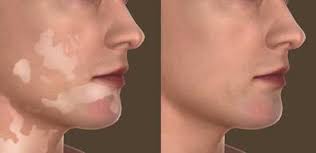Dignosing Vitiligo

Your GP should be able to identify vitiligo by its appearance, so tests are not usually needed. Your GP will need to see all of your patches of vitiligo to estimate how much of your body area is affected. They will also ask how long you have had the patches.
Your GP may ask you whether:
There is a history of vitiligo in your family, other autoimmune conditions in your family. You have injured the affected area of skin - for example, you have had sunburn or a severe rash there. You tan easily in the sun, or whether you burn. Your GP may also ask you about the impact that vitiligo has on your life. For example: How much it affects your confidence and self-esteem. Whether it affects your job.
Wood's lamp
If one is available, your GP may use an ultraviolet lamp called a Wood's lamp to look at your skin in more detail. You will need to be in a dark room and the lamp will be held 10-13cm (4-5in) away from your skin.
Under the ultraviolet light, the patches of vitiligo will be easier to see. This can help your GP tell the difference between vitiligo and other skin conditions, such as pityriasis versicolor (a yeast infection that causes a loss of pigment in small, round patches).
Other autoimmune conditions
Non-segmental vitiligo, the most common type of vitiligo, is closely associated with other autoimmune conditions. Your GP may therefore assess you to see if you have any symptoms that could suggest an autoimmune condition, such as:
Being thirsty and needing to urinate often (signs of diabetes)
Being tired and lacking in energy (signs of Addison's disease)
Your GP may also take a sample of blood to test how well your thyroid gland is functioning. Your thyroid gland is found in your neck, and it produces hormones that control the body's growth and metabolism.
You may need your thyroid tested once a year in case you develop an autoimmune condition that affects your thyroid, such as an overactive thyroid (hyperthyroidism).
Autoimmune condition
An autoimmune condition is when your immune system (the body's natural defence system) produces antibodies (proteins) that should fight infections, but instead attack your body's healthy tissues.
Hormones
Hormones are groups of powerful chemicals that are produced by the body and have a wide range of effects.



Leave a Comment